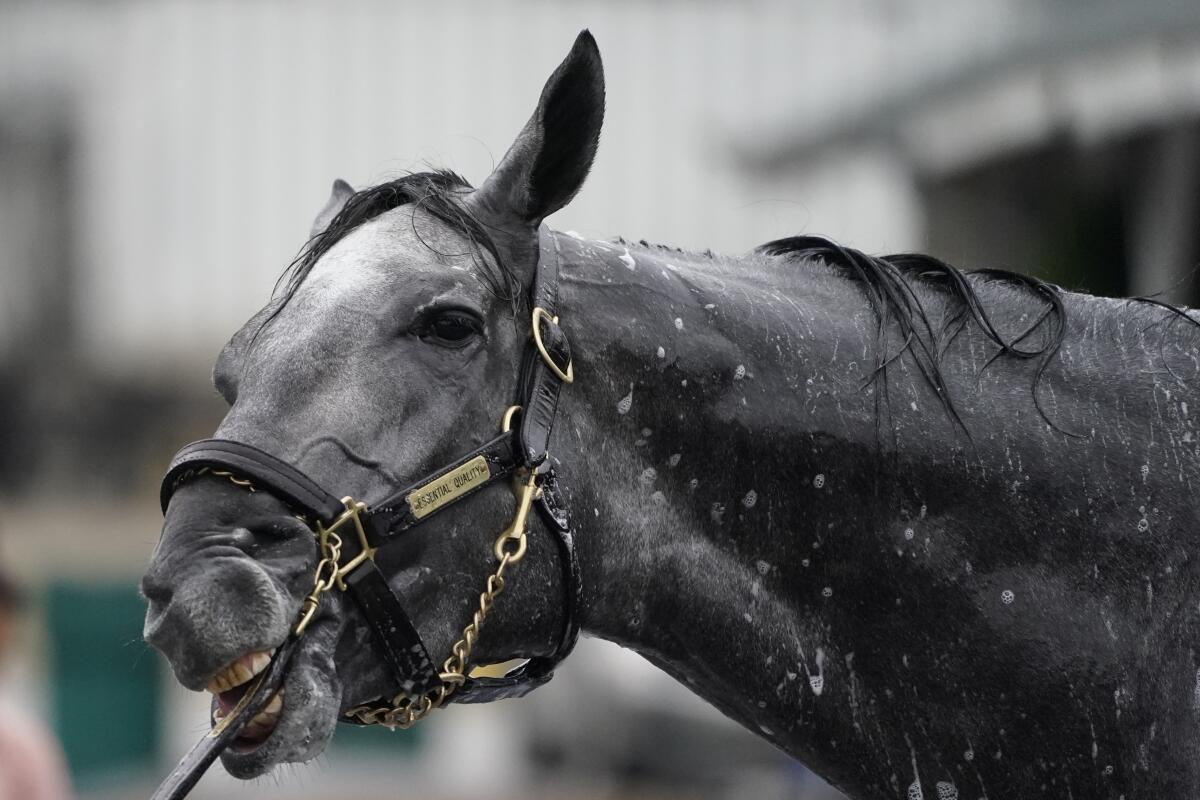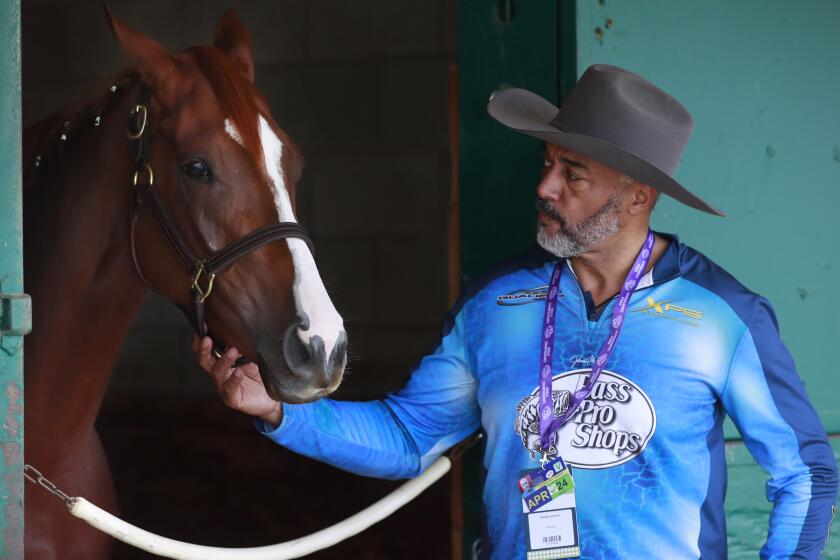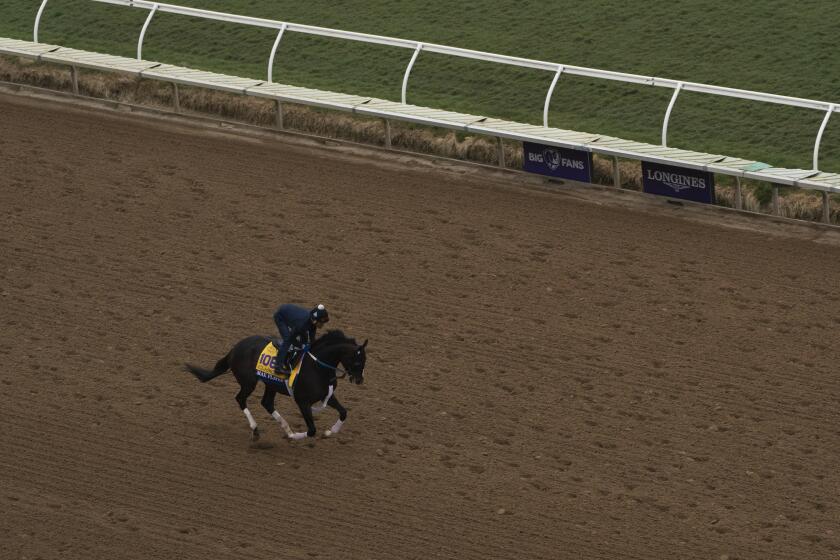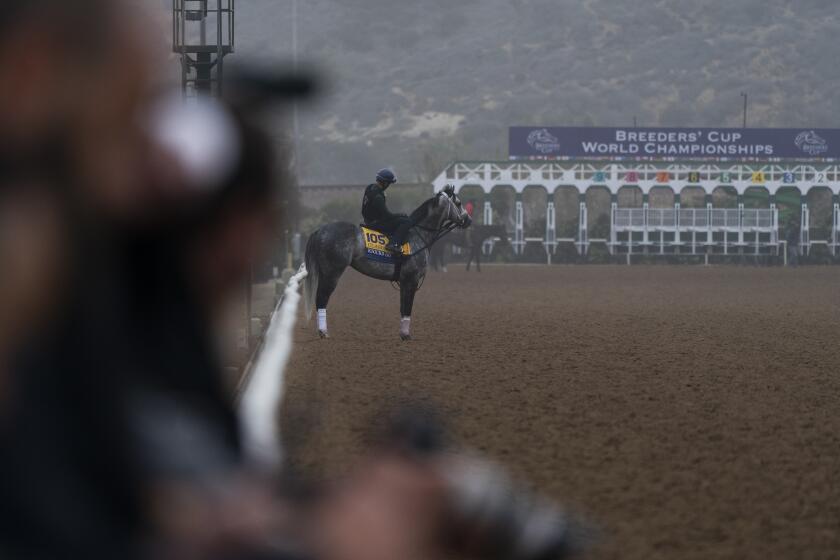Why the Breeders Cup’ Classic winner almost always retires to pasture

DEL MAR — Horse racing is a sport desperately in need of stars. So, when there is a winner of Saturday’s $6 million Breeders’ Cup Classic, the richest race in the United States, you would think the marketing campaign would start immediately.
Not necessarily.
Five of the last six winners of the Classic were essentially retired after running the race. In fact, the owners and trainers of Essential Quality, a 3-year-old who has won eight of nine lifetime races, have announced the lightly raced colt is already set to go to the breeding shed after Saturday.
There are several factors that go into the decision to retire a horse and most, not surprisingly, have to do with money.
George Leonard III is the first American-born Black trainer to enter a horse, California Angel, in the 37-year history of the Breeders’ Cup.
“The biggest thing that people don’t understand is the insurance you must buy,” said Elliott Walden, president and chief executive of WinStar Farm. “If you take a horse that’s worth $20 million, your insurance to keep him in training is 4% for mortality. That’s a lot of money to put out and then have to earn back at a rate of 60% of the purse and that doesn’t even count what you pay jockeys and trainers.
“It’s just hard economically to keep those horses in training. Our purse structure is loaded to 3-year-olds [and the Triple Crown.]”
That points to the another major factor, the lack of big money races for horses at least 4 years old.
The Santa Anita Handicap, once the most prestigious race at that track and worth $1 million, has been dropped to $600,000. The race is even overshadowed on that race day by the San Felipe Stakes, a prep race for the Kentucky Derby. A handicap race is one in which horses are given different weights that the jockey must carry in the hopes of equalizing the field.
“I think handicap racing in America has diminished too much and the emphasis is too much on 2-year-olds and 3-year-olds,” said John Shirreffs, who won the Classic in 2009 with Zenyatta, a mare. “We forget about the older horses and don’t give them a lot of opportunities to run in handicap races. I think we need to develop a better handicap program and add a little prestige so the older horses will stick around and run.”
One horse is euthanized after sustaining an injury in a training session at San Luis Rey Downs and another horse dies while running loose at Del Mar.
Shirreffs has built a stable of owners who like to see horses stick around. He has 4-year-old Express Train in the Classic, who is expected to come back as a 5-year-old.
Express Train was sired by Union Rags, whose stud fee is $30,000, compared to Essential Quality, who was sired by Tapit, whose fee is $185,000.
Last year’s Kentucky Derby and Classic winner was Authentic, who was immediately retired after winning the richest race.
“He stood for $75,000 and they bred him to 200 mares,” said his trainer, Bob Baffert. “That’s a lot of money. If these guys are going to stay in business they need the money to buy more horses.”

Authentic wins the 2020 Breeders’ Cup Classic on Saturday.
Authentic had another factor that made him more attractive in the breeding shed than on the race track. He was sired by Into Mischief, who goes for $250,000 a mating.
“If they have a fashionable pedigree, like Into Mischief, then they go to breeding,” Baffert said.
Baffert trained Arrogate, the only one of the six previous winners to keep running after winning the Classic. He followed that up with wins at the Pegasus at Gulfstream and Dubai World Cup before leveling off and retiring after finishing fifth in the Classic as a 4-year-old.
The Pegasus is a race designed to get one more performance out of a horse before going to the breeding shed, something Classic winners Gun Runner (2017) and Accelerate (2018) took advantage of. The race is in late January just before the start of the breeding season in February. All horses have the same birthday, Jan. 1, regardless of when they were foaled. So, breeders try and time the birth to as early in the year as possible, but never in December. The gestation period of a horse is 11-12 months.
Here’s how to watch all 14 races of the Breeders’ Cup on Friday and Saturday. Each race is worth at least $1 million and the competition is open to horses of all ages.
Baffert, who has won the Classic four times, took it in 2014 with Bayern and it was decided to run him another year.
“Bayern, he liked to run, and we got offered a lot of money for him,” Baffert said. “We ran him an extra year and we should have sold.”
He ran five times as 4-year-old with no wins.
Two horses that have a good shot in Saturday’s Classic are Medina Spirit, conditional winner of the Kentucky Derby, and Hot Rod Charlie, winner of the Louisiana and Pennsylvania Derbies. Doug O’Neill, trainer of Hot Rod Charlie, and Baffert, who trains Medina Spirit, have both said they will bring their colts back for another year regardless of where they place in the Classic.
You need look no further than their sires to see the thinking. Hot Rod Charlie is by Oxbow, who goes for $7,500 for a breeding share and Medina Spirit is by Protonico, a $5,000 stallion fee.
“If they’re not by a sire who throws sires, they tend to run longer,” Baffert said.
More to Read
Go beyond the scoreboard
Get the latest on L.A.'s teams in the daily Sports Report newsletter.
You may occasionally receive promotional content from the Los Angeles Times.














